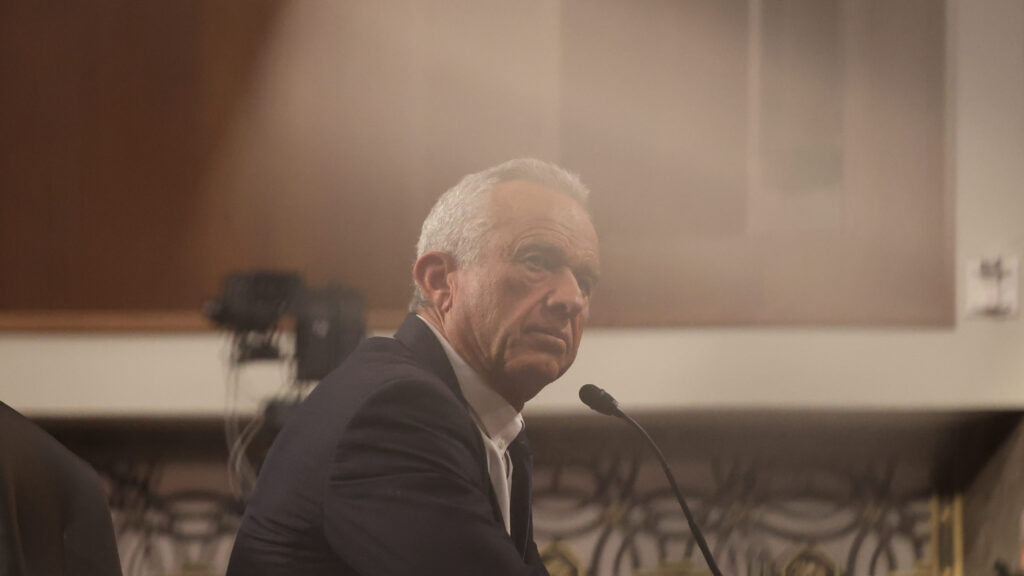Now that Robert F. Kennedy Jr.’s two confirmation hearings have concluded on Capitol Hill, we have clear evidence that he is unfit to lead our nation’s largest health agency.
Throughout the hearings there was a great focus on his years long efforts to undermine the public’s confidence in vaccines. His advocacy record against vaccines has been exhaustively examined and is clear, unequivocal and beyond dispute.
advertisement
But the hearings also made it clear to that he is unqualified well beyond his positions on vaccines. Kennedy’s testimony demonstrated that he has neither the training, management experience, judgment, or understanding of science to be our nation’s chief health official.
He is an environmental lawyer whose training and experience is inadequate for this position. This was evident when he showed he was unprepared as a witness and unable to answer the most fundamental questions about health and health policy. This was not clever political question dodging. His answers to most questions were confusing and showed little grasp of the factual material required for this position. While the HHS secretary does not have to be an epidemiologist, the person in the position should possess the basic intellectual curiosity and drive to hit the ground running. The number of significant health challenges that need to be addressed on day one demands someone with the rigor and basic capacity to analyze facts, craft solutions and coordinate a response. Being HHS secretary is not an internship.
HHS has an operating budget of almost $2 trillion, about 17% of the U.S. gross domestic product. It has a staff of over 80,000 people across 13 operating divisions. It is a complex organization covering almost every aspect of our lives. Kennedy’s management experience is limited, having been involved with a couple of environmental advocacy groups with revenues in the $9 million to $30 million range and nothing with any degree of complexity.
advertisement
His judgment and temperament for the job are questionable. He has demonstrated erratic actions over the years, including dumping a dead bear in Central Park and promoting conspiracy theories. His truthfulness is also highly questionable, as he has shown a tendency to cherry-pick facts to support his false statements, exaggerate issues, and flip-flop on key issues. He is among the nation’s most prolific purveyors of misinformation about vaccines, antidepressants, the cause of HIV, and environmental toxins. He even promoted the dangerous practice of consuming raw milk as we deal with the current bird flu outbreak affecting dairy cows. It was crystal clear from the hearings that his actions are hazardous to our health. And, when Kennedy says he just wants more research and will respond to the data, he is leaning on the same old, tried-and-true anti-vaxxer playbook he always has. Sow doubt. Strew uncertainty. Spread fear.
One of the most glaring deficits Kennedy showed was a remarkable lack of understanding of even the basic tenets of our health care financing system. He repeatedly confused Medicare with Medicaid, did not understand the basics of the Affordable Care Act, and consistently misstated known facts on the positive health benefits and clinical outcomes of Medicaid on beneficiaries. The Centers of Medicaid and Medicare Services is the single largest payer for health care in the nation. It directly covers about half of all Americans and influences the health policies for all. He must understand this complex system if he is going to oversee it. He does not.
Kennedy is correct in shining a light on the preventable chronic disease epidemic that causes the majority of deaths in the U.S. However, he mischaracterizes chronic diseases and the solutions to address them.
He falsely attributes a rise in children’s chronic diseases to mass poisoning by environmental toxins. (He includes vaccines as part of these “toxins.”) It is one thing to advocate for more research on the association between certain chemicals, such as PFAS, and childhood obesity; it is another to put forward a conspiracy that accuses federal scientists of hiding the truth from the public.
advertisement
His blame on the pharmaceutical sector stems from his continued campaign against vaccines. While all medical products have benefits and risks, vaccines have been shown to be one of the most important public health tools in history, having saved millions of lives across generations. Advocating for more vaccine safety research is reasonable; actively encouraging vaccine hesitancy at a time when we are seeing greater vaccine-preventable illness than ever before is dangerous.
He has stated that he wants federal agencies to focus on chronic diseases and not infectious diseases when they are inextricably linked. People have a higher risk of severe outcomes from infectious disease threats if they already suffer from one or more chronic illnesses, and infectious diseases can exacerbate or cause some non-communicable conditions. NIH should increase research on nutrition, including on ultra-processed foods; but it should not pause its research on infectious diseases.
Inadequate management experience, uninformed on health care financing, wrong on vaccines, and wrong on chronic diseases. The Senate should reject Kennedy for the sake of our health. He has demonstrated conclusively that he is not the one.
Georges C. Benjamin, M.D., is executive director of the American Public Health Association.

